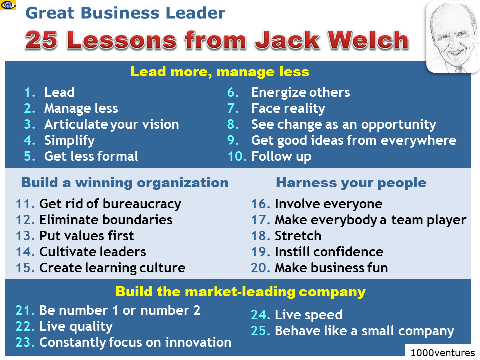| |
|
In
one of his first speeches as CEO
of GE, Jack Welch, explained
that he was not going to lay out
an "all-inclusive" grand
strategy or step-by-step agenda
for the company. Instead, he was
going to articulate a vision and
a few clear goals for the
company.
|
|
 |
 |
Best leaders are visionaries. They do
not get caught up in the minutiae or obsess over every detail, but
instead inspire others to execute on that vision. |
Jack Welch
GE |
| |
To
Welch, there are several reasons
why it is better to lay out a
general vision and not an exact
blueprint. It is the leader's
responsibility to come up with
the vision. Once the vision was
communicated, it
is up to the team to turn this
vision into a reality. A leader
who spends too much time on the
details is likely overmanaging.
It is much better to give a
general direction and empower
the team to figure out the exact
route.
|
|
 |
| |
Jack Welch believed that the
only way to lead is to talk
about company's values, not
numbers. Numbers have little to
do with creating a vision of
fulfilling a mission; they don't
instill corporate values into
the minds and hearts of the
employees, and they don't
provide much help in living up
to those values or carrying out
the vision.
|
|
|
 |
The leader's unending responsibility
must be to remove every detour, every barrier, to ensure that vision
is first, clear, and then real. |
Jack Welch
GE |
| |
Create and project a clear
vision
Give a general direction and
empower the team to figure out
the exact route.
"The leader must create an
atmosphere in the organization
where people feel not only free
to, but obliged to demand
clarity and purpose from their
leaders."
|
|
Leaders Sell Dreams, Hopes and Self
GE Leadership
Effectiveness Survey
Advice by Victorious
Revolutionaries |
|
 |
The best leaders do not provide a
step-by-step instruction manual for workers. The best leaders are
those who articulate a vision that inspires other to act. |
Jack Welch
GE |
|
|
|